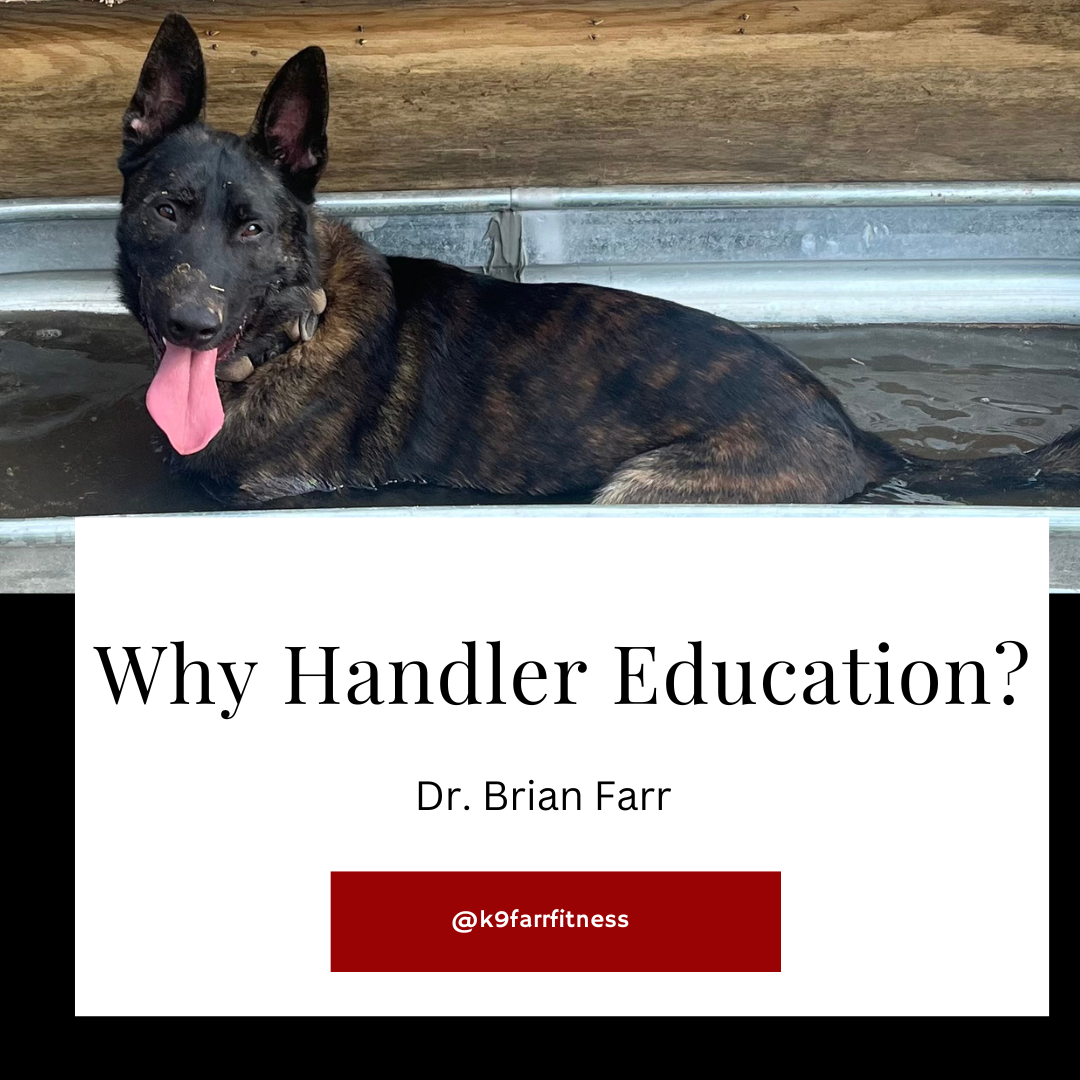As a veterinarian specializing in preventive medicine and sports medicine, I have witnessed the profound impact that proper education and training can have on the well-being and performance of working dogs. Canine handler education is not just about teaching handlers how to control their dogs; it is about equipping them with the knowledge and skills to understand canine behavior, communicate effectively with their dogs, and ensure their welfare in various working environments. In this blog post, I will delve into the evidence supporting the importance of canine handler education and explore the factors that contribute to successful handler-dog partnerships.
Handlers Have a Serious Job
Canine handler education encompasses a range of topics, including canine behavior, training techniques, communication methods, and understanding the needs of working dogs in different contexts. Effective handler education programs aim to empower handlers to develop strong bonds with their dogs, anticipate and address behavioral challenges, and promote the overall welfare and performance of their canine partners.
A solid understanding of canine behavior is essential for effective communication and training between handlers and dogs. Research has revealed insights into the social, cognitive, and emotional capabilities of dogs, highlighting the importance of recognizing and interpreting canine body language, vocalizations, and behavior cues. Handlers who are educated about canine behavior can better anticipate their dogs’ needs, prevent behavioral problems, and foster positive interactions between dogs and humans.
Positive reinforcement training techniques, based on principles of operant conditioning, have been widely recognized as effective and humane methods for teaching dogs desired behaviors. Studies have demonstrated that dogs trained using positive reinforcement methods exhibit higher levels of obedience, fewer behavioral problems, and stronger bonds with their handlers compared to dogs trained using aversion methods. Educating handlers about the principles and applications of positive reinforcement training can enhance the effectiveness of training programs and promote the welfare of working dogs.
Education Impacts Handling
Effective communication and bonding between handlers and dogs are crucial for establishing successful partnerships and achieving desired outcomes in various working contexts. Research has shown that dogs form strong attachments to their handlers based on factors such as clear communication, mutual trust, and consistency. Handlers who communicate clearly, provide appropriate feedback, and build trust-based relationships with their dogs are more likely to achieve cooperation, reliability, and resilience in challenging situations.
Ensuring the welfare of working dogs is paramount in all aspects of handler education and training. Studies have highlighted the importance of recognizing signs of stress, fatigue, and discomfort in working dogs and implementing strategies to mitigate these risks. Educating handlers about canine welfare needs, including proper nutrition, hydration, enrichment, rest, and veterinary care, is essential for promoting the health, safety, and longevity of working dogs in various roles.
Handlers with experience and expertise in working with dogs are better equipped to understand and respond to the needs of their canine partners. Practical hands-on experience, supplemented by formal education and training programs, can enhance handlers’ knowledge, skills, and confidence in managing working dogs effectively.
Continuing education and professional development opportunities are essential for keeping handlers abreast of the latest advancements in canine behavior, training techniques, and welfare practices. Ongoing training programs, workshops, seminars, and certifications enable handlers to refine their skills, expand their knowledge base, and stay updated on best practices in the field.
Organizations that support handler education…
- Develop and implement comprehensive handler education and training programs that cover essential topics such as canine behavior, training techniques, communication skills, and welfare considerations. These organizations tailor training programs to the specific needs and roles of working dogs in different contexts, including law enforcement, search and rescue, therapy, and service work.
- Promote the use of positive reinforcement training techniques as the primary method for teaching and shaping desired behaviors in working dogs. They educate handlers about the benefits of positive reinforcement, including enhanced learning, improved performance, and strengthened bonds with their canine partners.
- Create opportunities for handlers to collaborate, share experiences, and learn from each other through mentorship programs, peer support networks, and collaborative training exercises. They foster a culture of teamwork, professionalism, and mutual respect among handlers to promote the welfare and success of working dogs.
- Prioritize canine welfare considerations in all aspects of handler education and training, including recognizing and addressing signs of stress, fatigue, and discomfort in working dogs. They provide handlers with the knowledge, skills, and resources to ensure the health, safety, and well-being of their canine partners in various working environments.
Organizations that prioritize canine welfare and invest in comprehensive handler education and training programs are more likely to achieve positive outcomes for working dogs. A supportive organizational culture that values education, collaboration, and continuous improvement fosters a positive working environment for handlers and promotes the welfare and success of working dogs.
In conclusion, canine handler education plays a critical role in promoting the welfare, success, and longevity of working dogs in various roles and contexts. By understanding the evidence supporting the importance of handler education and implementing practical strategies for education and training, we can empower handlers to develop strong bonds with their canine partners, communicate effectively, and ensure their welfare in all aspects of their work. As advocates for working dogs, it is our responsibility to prioritize handler education and support ongoing efforts to enhance the knowledge, skills, and professionalism of handlers in the field.
